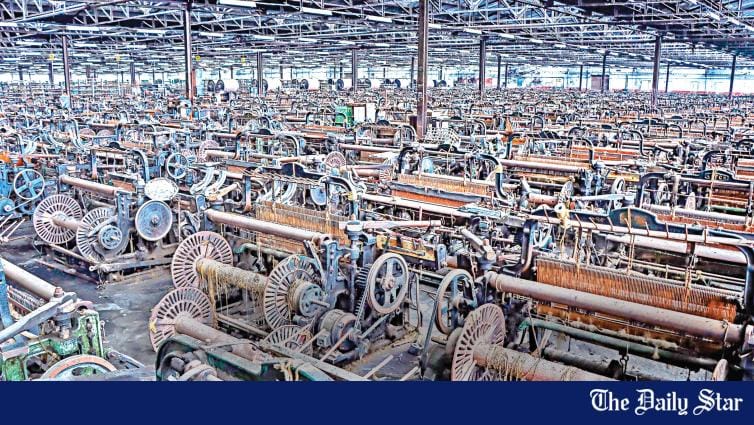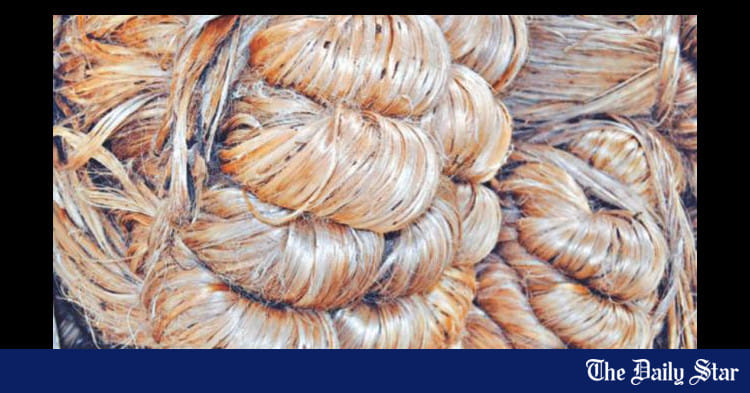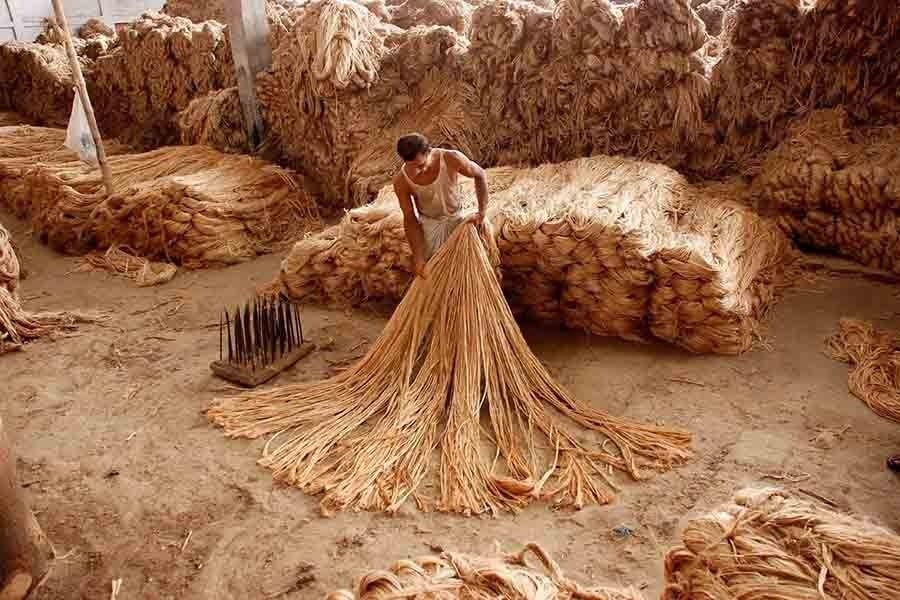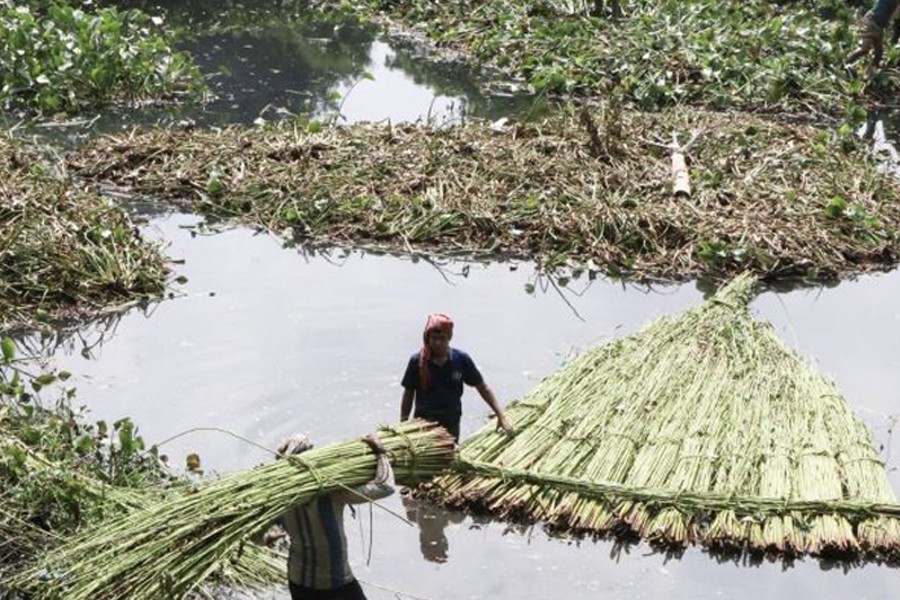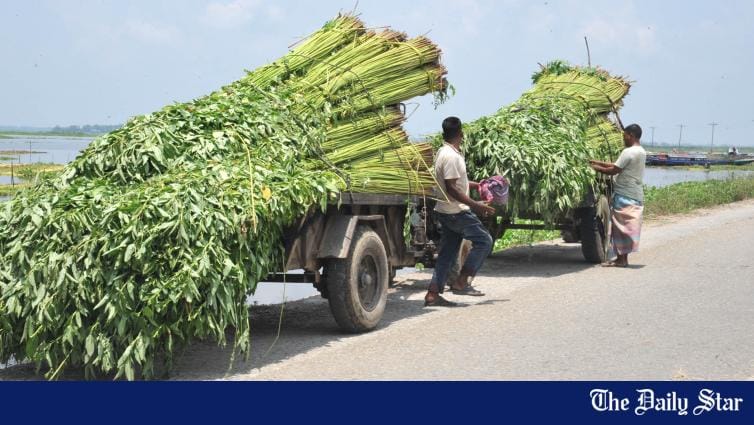Saif
Senior Member
- Joined
- Jan 24, 2024
- Messages
- 15,442
- Nation

- Axis Group


undefined | The Financial Express
Massive plan afoot to grow jute in Khulna region
OUR CORRESPONDENT
Published :
May 27, 2025 08:31
Updated :
May 27, 2025 08:31

KHULNA, May 26: Farmers have taken extensive plans to bring a vast tract of land into jute cultivation in Khulna region and grow the cash crop on a massive scale this season.
Jute is a cash crop which is known as 'golden fibre' in the country whose climate and soil are suitable for its production.
According to official sources, jute sowing began in Khulna region in the first week of April. In order to increase jute production, intensive cultivation is now underway.
They believe if weather is favourable, it will be possible to start harvesting jute in mid-July to the first week of September.
Farmers will be able to achieve the target, which will create interest among other farmers for jute production.
The huge jute production will play an important role in the country's economy.
According to sources from the Department of Agricultural Extension, Khulna region has set a target for jute cultivation and production in the current 2025-26 Kharip-1 season in order to increase jute production in this region.
Some 1,447 hectares of land will be brought into jute cultivation in Khulna district, 1,960 hectares in Bagerhat, 12,550 hectares in Satkhira and 23,900 hectares in Narail.
DAE sources the target has been fixed to grow jute on 38,078 hectares in Khulna region.
In the current Kharip-1 season, initiatives have been taken to achieve the target on 1,471 more hectares of land in Khulna region compared to last year's.
Shahbuddin, a farmer of Dighlia, said, "This year I have cultivated jute on 5 hectares of land. I have given water to the field."
Local upazila agricultural office provides overall assistance, he added.
Md Amirul Islam, deputy assistant agriculture officer of Kalia Upazila Agriculture Office, said jute has been cultivated on 150 hectares of land in different villages of Dhushati, Bil Bauch, and Baladanga blocks in my Salamabad Union.
Jute cultivation began in mid-April of this year, which has already been completed. After sowing, various works including weed control, thinning to increase the height of the trees, application of chemical fertilizers, and disease and insect control are underway.
Khulna's Dighalia Upazila Agriculture Officer Kishore Ahmed said that in order to increase jute production in Dighalia, 50 hectares of land have been brought into jute production. The upazila agriculture office is providing overall support for farmers to grow jute. Khulna Region DAE Additional Director Md Rafiqul Islam said that the target of jute cultivation and production has already been set for the current 2025-26 Kharip-1 season. The target of jute cultivation in the Khulna region has been set at 39857 hectares of land.
Against the production target, the cultivation in this region has already progressed by 38,078 hectares, which is 95.5 per cent.
This season, initiatives have been taken to achieve the target on 1,471 more hectares of land in Khulna region compared to last year's.
OUR CORRESPONDENT
Published :
May 27, 2025 08:31
Updated :
May 27, 2025 08:31
KHULNA, May 26: Farmers have taken extensive plans to bring a vast tract of land into jute cultivation in Khulna region and grow the cash crop on a massive scale this season.
Jute is a cash crop which is known as 'golden fibre' in the country whose climate and soil are suitable for its production.
According to official sources, jute sowing began in Khulna region in the first week of April. In order to increase jute production, intensive cultivation is now underway.
They believe if weather is favourable, it will be possible to start harvesting jute in mid-July to the first week of September.
Farmers will be able to achieve the target, which will create interest among other farmers for jute production.
The huge jute production will play an important role in the country's economy.
According to sources from the Department of Agricultural Extension, Khulna region has set a target for jute cultivation and production in the current 2025-26 Kharip-1 season in order to increase jute production in this region.
Some 1,447 hectares of land will be brought into jute cultivation in Khulna district, 1,960 hectares in Bagerhat, 12,550 hectares in Satkhira and 23,900 hectares in Narail.
DAE sources the target has been fixed to grow jute on 38,078 hectares in Khulna region.
In the current Kharip-1 season, initiatives have been taken to achieve the target on 1,471 more hectares of land in Khulna region compared to last year's.
Shahbuddin, a farmer of Dighlia, said, "This year I have cultivated jute on 5 hectares of land. I have given water to the field."
Local upazila agricultural office provides overall assistance, he added.
Md Amirul Islam, deputy assistant agriculture officer of Kalia Upazila Agriculture Office, said jute has been cultivated on 150 hectares of land in different villages of Dhushati, Bil Bauch, and Baladanga blocks in my Salamabad Union.
Jute cultivation began in mid-April of this year, which has already been completed. After sowing, various works including weed control, thinning to increase the height of the trees, application of chemical fertilizers, and disease and insect control are underway.
Khulna's Dighalia Upazila Agriculture Officer Kishore Ahmed said that in order to increase jute production in Dighalia, 50 hectares of land have been brought into jute production. The upazila agriculture office is providing overall support for farmers to grow jute. Khulna Region DAE Additional Director Md Rafiqul Islam said that the target of jute cultivation and production has already been set for the current 2025-26 Kharip-1 season. The target of jute cultivation in the Khulna region has been set at 39857 hectares of land.
Against the production target, the cultivation in this region has already progressed by 38,078 hectares, which is 95.5 per cent.
This season, initiatives have been taken to achieve the target on 1,471 more hectares of land in Khulna region compared to last year's.



